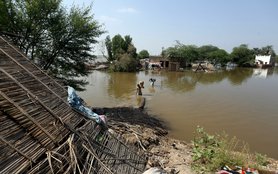COP26 in Glasgow was billed as a make-or-break moment for the world’s collective fight against the climate crisis. Did it deliver on that promise?
For two slim weeks, the climate crisis took the front of the global stage as COP26 unfolded in Glasgow. While we watched, and marched, and staged dramatic stunts, the leaders did a lot of talking. The end result? A flurry of pledges and announcements.
And is that enough? Sadly, the answer is No. For the millions of vulnerable communities and people already facing climate devastation, the final pact simply falls short.
Richer countries, including the US, failed to meet the urgency of the moment
Despite new emissions reduction pledges made at COP26, the world is still on track for global warming that far exceeds the 1.5-degree C goal contained in the Paris Agreement.
The pact’s request to strengthen 2030 reduction targets by the end of next year is an important step, and countries must increase their ambitions to keep 1.5 degrees C within reach. As many small island nations reminded us in Glasgow, the difference between 1.5 degree C and 2 degree C is a death sentence for many communities.
Global emissions need to be slashed drastically by the end of this decade, and the sharpest emissions cuts must come from wealthy, developed countries responsible for the largest share of cumulative emissions.
Key gaps also remain in providing much-needed finance to help countries not just mitigate climate change, but also adapt. So far, developed governments have failed to meet their promise to raise $100 billion a year in climate finance by 2020.
It is encouraging, however, that a goal for adaptation finance was established, with a commitment to double the collective share of adaptation finance within the $100 billion annual target by 2025. Even though the commitment is far below what developing countries asked for and need, it will channel more resources towards adaptation.
The most glaring omission was the lack of any mention of a finance plan for loss and damage. Poor communities in developing countries are already experiencing the crushing impacts of climate change. Extreme floods and droughts are forcing people from their homes, destroying farms, and damaging lives and livelihoods. Rich countries have a responsibility to recognize the urgency of addressing loss and damage.
Instead, the US and EU blocked a proposal from developing countries for a loss and damage finance facility to build back in the aftermath of extreme weather events linked to climate change.
But there were some signs of progress
The pact reached in Glasgow makes an unprecedented reference to fossil fuels, and recognizes the importance of reducing inefficient fossil fuel subsidies and dependence on coal. Even though the actual text itself is weak, it is an historic first for a UN climate agreement backed by 200 nations.
In addition, the US, along with other countries, made significant commitments to cut emissions of methane (a potent planet-warming gas) by 30% by the end of this decade. Another pledge aims to end deforestation by 2030. The landmark forests agreement covers about 85% of the world’s forests, and crucially includes $1.7 billion for strengthening land rights of indigenous peoples who are important stewards of forests.
The US and 20 other countries also made a vital commitment to end fossil fuel financing abroad, which could take billions of dollars away from future fossil fuel production and redistribute it to clean energy projects.
And, in a surprise last minute development, the US and China announced a joint agreement to do more to cut emissions this decade.

The US can and must do more
After pulling out of the Paris Agreement under the previous administration, the Biden Administration has been rebuilding US credibility on global climate issues. Steps in the right direction include rejoining the Paris Agreement; announcing a new emissions reduction target to cut economy wide emissions by 50-52% by 2030; and committing to scale up international climate finance by providing $11.4 billion per year.
Now, the US needs to increase the ambition of its emission reduction pledge (in accordance with its fair share) and do what is needed to hold temperature increases to 1.5-degree C. Equally important, the US must scale up support for vulnerable communities, including increasing financing for adaptation and for loss and damage.
It’s essential that pledges made on the world stage are backed up by meaningful action at home. This requires engaging the whole of government and Congressional action.
Congress currently has the opportunity to pass the most significant climate legislation the US has ever seen: The Build Back Better bill would help put the US on track to achieving its economy-wide emissions reductions target and spur a just clean energy transition. Congressional action is also needed to appropriate the funds that the Biden administration has pledged to support other countries, and to eliminate harmful subsidies that prop up the fossil fuel industry.
While COP26 may be behind us, the fight to ensure climate justice continues. And while the Glasgow Climate Pact did not deliver the outcomes many had hoped for, there is no time for despair.
Alongside millions of young people, activists, and frontline communities, we need to continue to hold governments and companies accountable for ambitious climate action that protects people and the planet, and tackles the inequality that is at the heart of the climate crisis.
______________________________________________
Take action: The Biden administration has made big commitments to reduce emissions and support the most vulnerable. Now, the US must take action to fulfil these commitments in a way that centers the world’s most vulnerable and marginalized communities, and addresses the disproportionate gender and racial impacts of a changing climate both at home and abroad.


